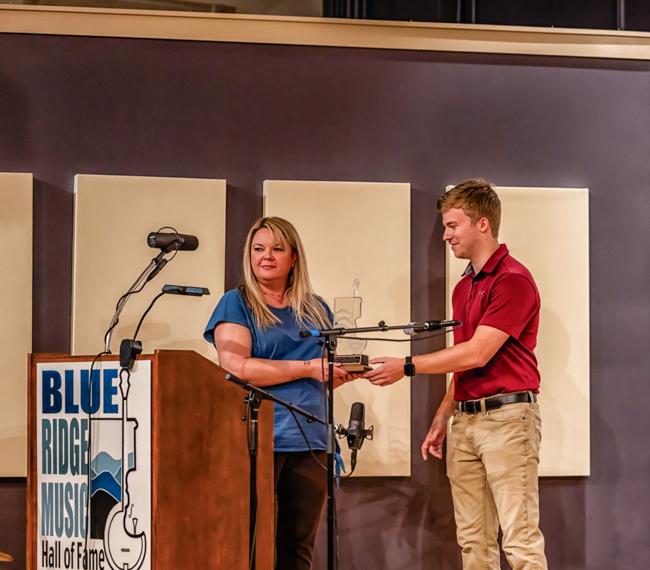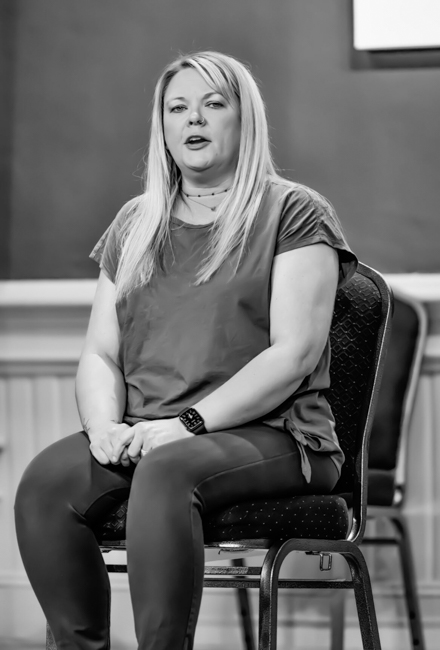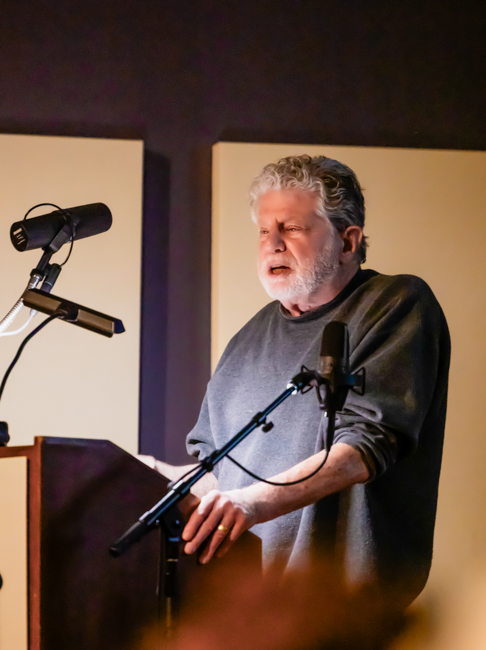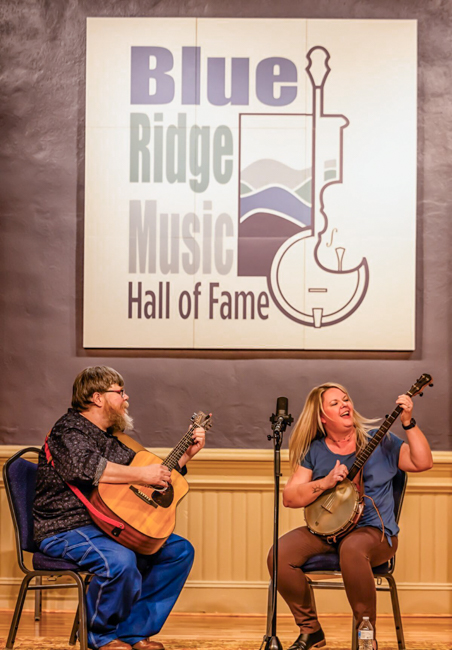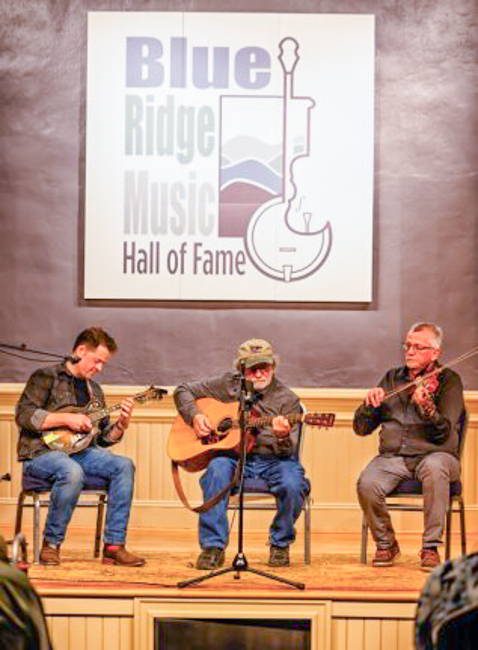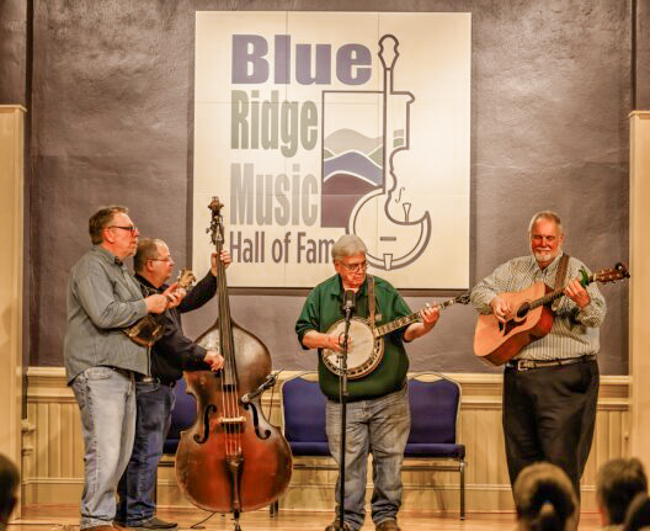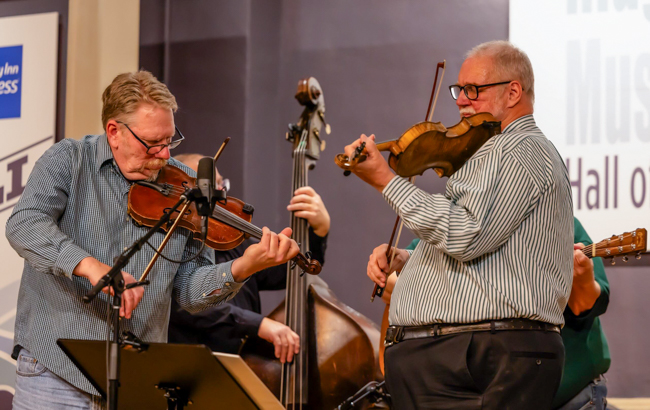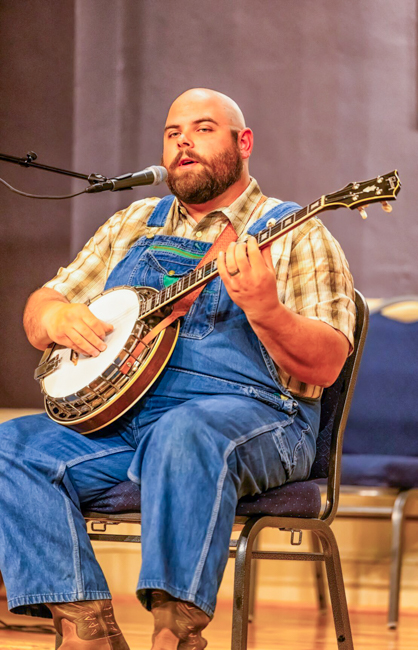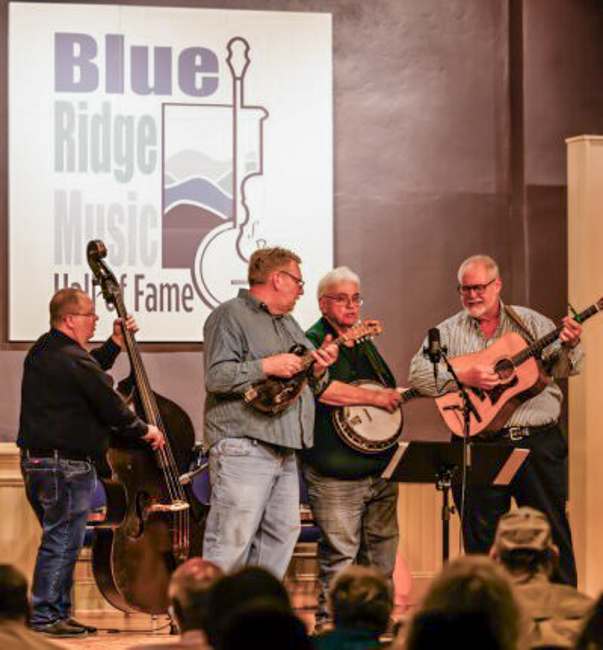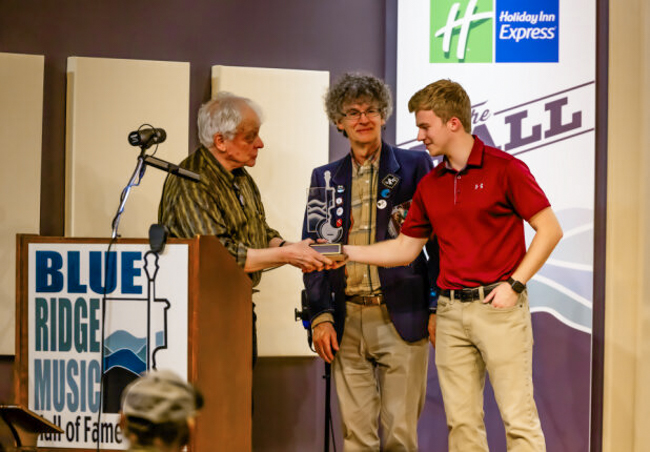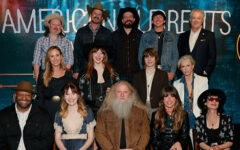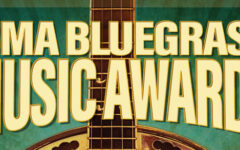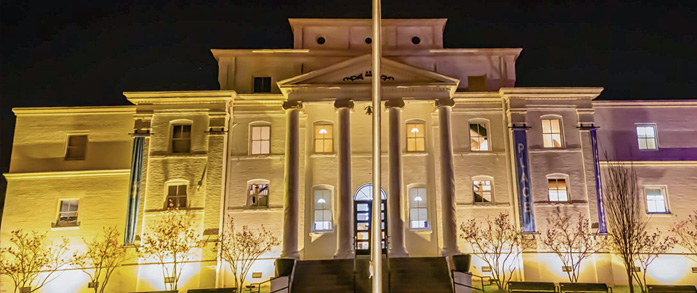
March 22, the Blue Ridge Music Hall of Fame rang in their seventeenth annual induction ceremony. This year’s ceremony featured artists from deep in the coves and hills of the Blue Ridge region, and even two inductees who were brought into these mountains by way of their love for the music. The 2025 Blue Ridge Music Hall of Fame class includes Steve Kilby, Sheila Kay Adams, Dock Boggs, Gerald Anderson, the Kruger Brothers, Rounder Records, and Riley Baugus.
The first award to be presented was the Dr. T. R. Bryan Wilkes Heritage Award; this recognition is given to musicians from various genres or involvements who have contributed to the musical heritage and enrichment of Wilkes County. The award is named for one of the hall of fame’s charter members, Dr. T. R. Bryan, who was a lover and great supporter of the music of his home community of Wilkes. Each year, Dr. Bryan’s daughter, Pam Terrell, introduces the award before its presentation.
“He [Dr. Bryan] was one of the founding members of this Blue Ridge Music Hall of Fame; he was whole-heartedly dedicated to the work,” Pam told the audience. “I can remember him being so excited every time that the committee would meet. He was excited about searching for band members, singers, songwriters, performers… anybody to honor by inducting them into the hall of fame each year. I know he would be so pleased to see how the Blue Ridge Music Hall of Fame has grown, and that its original mission to showcase the rich musical heritage of the greater Blue Ridge Mountain area has been continued all these years.”
This year’s Dr. T. R. Bryan award recipient was Steve Kilby. Steve grew up in North Wilkesboro and began playing guitar at the age of twelve. His musical career has included working with the Green Valley Boys, Hoyt Herbert and the Strings of Five, Blue Ridge Grass, the Sullivan Brothers, the Clarence Green-John Hartley Band, and Garland Shuping’s group, Wild Country. He also worked as a part-time studio engineer at Heritage Records up in Galax, Virginia, which is where he recorded his album, Sunday Night, which was comprised entirely of Steve’s original compositions. Though he has certainly had quite the musical career, Steve is even better known for his teaching. He worked as one of the original instructors in the JAM (Junior Appalachian Musicians) program, in addition to teaching at Steve Kaufman’s Acoustic Camps and the John C. Campbell Folk School. Steve has taught many young pickers who have grown up to become some of our music’s finest. His long-time friend, Bill Williams, who he met working at American Drew Furniture there in Wilkes, presented the award to him and said, “He’s quite a versatile musician and songwriter, and just an all around good person. It’s just an honor for me to talk a little bit about him up here.”
“I’d like to thank everyone who voted for me to get this award. I never thought I would win anything like that, but I really appreciate it,” Steve said as he accepted the award. For his performance, Steve played Big Sandy River and Wildwood Flower with David Johnson, Eric Ellis, Scott Freeman, and Scott Gentry who make up the hall of fame’s house band, Virginialina.
Sheila Kay Adams was honored next with her induction in the Master Musician and Tradition Bearer category. Sheila Kay is a seventh-generation ballad singer, storyteller, and clawhammer banjo player from the Sodom community of Madison County, NC. She grew up learning from eight traditional ballad singers, and members of her family sang for Cecil Sharp when he came through Appalachia collecting the old, mountain ballads. Her great-aunt, Dellie Chandler Norton, and other members of the Sodom community including Cass Wallin and Dillard Chandler, taught Sheila the ballad-singing tradition she carries on today. In 1976, Sheila, along with the eight ballad singers she grew up around, travelled to Washington, DC, to sing at the nation’s bicentennial celebration. Sheila Kay has shared this tradition with audiences across the United States and the world at festivals like the International Storytelling Festival and the Smithsonian’s Folklife Festival. She has received many awards including a 2007 Lifeworks recognition, the 1997 North Carolina Historical Society’s historical fiction award for her book, Come Go Home with Me, the 1998 Brown Hudson Award from the North Carolina Folk Society, a 2016 North Carolina Music Heritage Award, and in 2013, she received the National Heritage Fellowship Award, the nation’s highest folk and traditional arts honor. Sheila Kay was unable to be at the ceremony due to illness, but her cousin, Donna Ray Norton, presented and accepted the award for her. Donna Ray described the great impact and influence that Sheila has had in her life, teaching her, the eighth generation, to carry on the songs and traditions of her people and our mountains.
“Her voice isn’t just beautiful, it carries the weight of generations, bringing our past to life in a way that’s powerful, heartfelt, and unforgettable. It’s the voice of our mountains, and it sounds just like home to me,” Donna Ray said. “Sheila’s deep connection to the land, the people, and the music of the Blue Ridge runs through her veins; she’s not just a performer, she’s a keeper of the flame: the torch bearer ensuring that the music of the generations before her continues to echo through the mountains for generations to come… [Sheila] You’ve inspired me and so many others to embrace our heritage and share it proudly… It’s a true privilege to be able to stand here today and celebrate you. You’ve given so much to this community, to this culture, and to all of us who have the joy of knowing you. Congratulations, Sheila, and thank you for being such an incredible example of what it means to follow your heart, share your truly incredible Appalachian gifts with the world, and stay connected to where you come from.”
Donna Ray also performed in Sheila’s absence; she sang Fine Sally in the old “hollerin'” style and played Fly Around on banjo with Riley Baugus on guitar.
The next category was the Pioneer Artist, and Dock Boggs received this award. Dock was a singer, songwriter, banjo picker, and outlaw in general from West Norton, Virginia. He acquired his first banjo around 1910, and began learning from the black musicians whose music he was fascinated with, as well as learning from Homer Crawford, his brother-in-law, Lee Hunsucker, and his brother, Roscoe. In 1927, Dock recorded a few songs for the Brunswick record label at the Norton Hotel, and then traveled to New York City to record more songs for them. He was offered a contract to record for them further after the success of these first records, but he refused. He formed his own band in 1928 called the Cumberland Entertainers that played together for the majority of the year until Dock headed from Virginia up to Kentucky in light of a disagreement between him and a local deputy sheriff. 1929 brought about another recording opportunity for Dock; he went up to Chicago to record four sides for the Lonesome Ace label. Eventually, at the insistence of his wife Sarah, he stopped trying to make his living with the music and returned to the coal mines where he’d worked before he began his musical career. His music was revived during the folk era, though, when Mike Seeger came around and was uncovering the older artists who were true pioneers of the music of these mountains. Seeger took Dock to play at folk clubs and festivals throughout the sixties, and brought him into the studio to record invaluable material that could’ve been lost for good had Dock not found his way back into a studio. Dock passed at age seventy-three in 1971.
Jack Wright, who worked with Appalshop, founded June Appal Recordings and the Roadside Theater, and wrote the book Music of Coal: Mining Songs from the Appalachian Coalfields, came to present for Dock Boggs’s induction. “When Dock stepped onto a stage, he brought a landscape of coal dust loaded with boom and bust, moonshine and murder, gambling and sinning. As he reached for the breath to sing his songs, the audience could hear the undertone of broken bodies, broken lives, living paycheck to paycheck, uncertainty, [and] his own black-lung disease from years of coal mining,” Jack began. He went on to discuss knowing and being fortunate enough to work with Dock for the last few years of his life, and the legacy of music that Dock Boggs left behind. Corbin Hayslett was there to perform for the induction, and Jack commented that when he’d been asked who would be best to perform for Dock, that he’d immediately recommended Corbin. The audience soon heard exactly why, as Corbin is as close as you can get to that distinctive Dock Boggs sound today. Corbin played Down South Blues and Danville Girl, providing a brief history of each song before he performed it.
Gerald Anderson was the next inductee in the Luthier category. Gerald was an apprentice of Wayne Henderson who began working at Wayne’s guitar shop sweeping floors, and eventually learned how to build fine guitars and mandolins. “He showed up at my shop I think in 1976, and I didn’t know what to think about somebody working in my shop, you know. I’d just been there by myself for years,” Wayne said about Gerald coming to work for him. “He came to the shop wanting to learn how to make instruments and said he was willing to sweep the floor or do anything just to hang around… What worried me about him was that Gerald was extremely smart. He did books, and he could figure out anything. I always thought, ‘You’re too smart to be in here in this mess making dust in a messy shop.’ But what he really wanted to do was make instruments and learn to play… He turned out to be probably my best friend, like a brother.” With what he’d learned from Wayne, Gerald went on to build Anderson Mandolins, start up the Anderson & Strickland Stringed Instruments company with Spencer Strickland, and teach at the Wayne C. Henderson School of Appalachian Arts in Marion, Virginia. Gerald was an inaugural member of The Crooked Road: Virginia’s Heritage Music Trail, and he played in the Rugby Gully Jumpers, Wayne Henderson & Friends, and the Virginia Luthiers. In total, Gerald built 178 mandolins, 143 guitars, 3 fiddles, 1 autoharp, 1 banjo, and 1 ukulele throughout his career as a famed luthier. Gerald Anderson passed June 20, 2019 at age 65.
The Virginia Luthiers featuring Spencer Strickland, Wayne Henderson, and Jimmy Edmonds were there to perform and present for Gerald’s induction. They played Eight More Miles to Louisville and Greenville Trestle High, two songs that the groups frequently played when Gerald was in them. Wayne was playing the 47th guitar that Gerald made. He and Wayne gave each other the guitar numbers that matched their birth years; Gerald gave Wayne the 47th guitar he made and Wayne gave Gerald his number 53. “He meant so much to me,” Spencer Strickland said. “He was almost a part of my everyday adult life from the time I was twenty years old up until the time he passed in June of 2019, very unexpectedly… His legacy lives on at the Wayne C. Henderson School of Appalachian Arts in Marion, Virginia. There, they have the Gerald Anderson Luthiery Studio.” Gerald’s younger sister Barbra Carter was present to accept the award. “I don’t know that I can add much to what you guys have said, other than that he was sincerely a very generous person of spirit and the heart, and very loved by pretty much everybody who ever met him. Thank you so much for being here, and thank you guys [the Virginia Luthiers] for being here and honoring him,” Barbra said as she accepted Gerald’s award.
The inductees in this year’s Nationally Known Artist category were the Kruger Brothers. Si Khan was present to introduce their portion of the ceremony. He recounted a very ecstatic Pete Werrnick running him down at MerleFest in 1997 and exuberantly attempting to tell him about what he had just witnessed on the Walker Center Stage. He says that Pete was rapid-fire asking if he’d ever heard of Jens Kruger or seen him play the banjo, to which Si responded he had not. Pete then proceeded to whip out an electronic metronome and show Si exactly how fast Jens had been playing with his excitement continuing to bubble over. Si stated that he had no idea what the number meant, but he went right along with Pete’s excitement. Pete went on to tell Si that Jens was a part of this Swiss group called the Kruger Brothers, and Si says that, “In less than four hours, I am sharing the stage with a bionic bluegrass band from Switzerland!” He continues with the tale of how they met and then says, “Listening, I realize I’m not just hearing great music, I am in the presence of genius. I don’t care if they’re bionic; I’ve almost never before heard music this beautiful, this emotional, this brilliant.” Si concluded his speech, and, because the Kruger Brothers could not be present, a video was played that had been recorded at their Kruger Academy that took place in February where Laura Boosinger presented them with their award. She decsribed how she met them and became familiar with their music. “Their heart is in the right place, and they even put it in their songs,” Laura mentioned when she was speaking about the home the Krugers had found in Wilkes County. “Uwe even talks about Doc wanting to hear the song where ‘I’m in it,’ and that line in the song, ‘I want to sing the songs that Doc has taught to me,’ and the other part of that song that always touched my heart because it’s my own personal story is, ‘the folk in Carolina have opened up their door and I’m not a stranger anymore.’ I feel that strongly, and I know they do too.”
“This is, for us, a great honor,” Jens began his acceptance speech. “When we came to play MerleFest the first time in 1997, we thought it was a one-off thing.” He spoke about the musical home they had found here among the musicians and mountains they had long admired. “To live in Wilkes County and to be here is a wonderful thing… We want to thank you all for inducting us into the Blue Ridge Music Hall of Fame amongst all these other great artists.” The Krugers gave their performance virtually and played Uwe’s song about finding their home in the hills of Carolina, Carolina in the Fall.
Rounder Records Founders, Ken Irwin, Marian Leighton Levy, and Bill Nowlin, would go into the hall of fame following the Kruger Brothers with their induction in the Recording Industry category. David Menconi, who authored the books, Oh Didn’t They Ramble: Rounder Records and the Transformation of American Roots Music and Step it up and Go: The Story of North Carolina Popular Music, presented. “When I’m writing a book, I always try to open it with an evocative scene to set the story, time, and place,” David began. “For Oh Didn’t They Ramble: Rounder Records and the Transformation of American Roots Music, I began with an anecdote that happened about a half-hour away from here [Wilkes County] a long, long time ago. The first few pages of the book describe an event this organization knows well: the Union Grove Old Time Fiddlers’ Convention… Union Grove was where, in 1972, Rounder founders Ken Irwin and Marian Leighton were selling records out of a van.” David went on to tell the story of how Rounder had a monumental impact on the entire scene of bluegrass and old-time music. Several Blue Ridge Music Hall of Fame members are featured in the vast catalog of Rounder, and some of bluegrass’s most famous recordings are on this label. Most notably the famed Rounder 0044, the first album by J. D. Crowe and the New South, that rocked the bluegrass world and elevated one of our standards, Old Home Place. Bill Nowlin was present to accept the award, but before he came up to the stage to do so, there was a surprise video from one of Rounder’s top selling and most notable artists: Alison Krauss and Union Station.
“We did start the company in 1970, and a lot of the inspiration came from here,” Bill said. “Ken and I were roommates in college in the Boston area, and we hitchhiked down to Union Grove in 1965…” And the rest is history. “It’s an honor for us to just be able to associate with the music, and we’ve always enjoyed that. Thank you all for those of you who may have bought a [Rounder] record over the years, and keep your ear out for more to come,” he said as he accepted his award.
The Blue Ridge house band, Virginialina, played Old Home Place and Ashokan Farewell, a fiddle tune that guitarist and fiddler David Johnson said, “Everybody would’ve bet money was from the Civil War. It was actually written in about the same period of time [that its respective album was released on Rounder], about the 1980s.”
The final inductee was Riley Baugus who went into the Sideman and Regional Musician category. Carol Rifkin and Becky Johnson presented Riley’s award. “Riley is one of those really remarkable people who came into this world with just an amazing gift,” Carol began. She told the audience about how she used to drive Riley and his friend, Kirk Sutphin, to festivals and to the home of Tommy Jarrell when they were just teenagers. Riley learned from traditional musicians the likes of Jarrell, Verlin Clifton, Dix Freeman, Benton Flippen, and Paul Sutphin. Riley has performed with a plethora of string bands including the Red Hots, the Old Hollow Stringband, and the Konnarock Critters, and has toured with Dirk Powell, Tim O’Brien, and Polecat Creek. He’s even recorded with Willie Nelson and Alison Krauss. “Growing up in the Baptist Church, Riley really developed a sense of style in singing,” Carol said. “I knew he was really good at things, but his singing surprised me at how beautiful and gifted it became.” Becky Johnson picked it up from there saying, “It was as if I knew Riley Baugus for years and years before I actually had the honor of meeting him in person… The music of Riley Baugus is timeless. Listening to him happily brings me back to a simpler, safer era that wasn’t really that long ago… It’s a real honor to have him inducted into the Blue Ridge Music Hall of Fame tonight.” Riley came up to accept his award, “Thank you so much,” he said, “You know, when I’m at a place where I’m at a lack of anything to say, you know you’ve touched a deep place… I cannot believe that I get this honor; this is one of the greatest honors I’ve had in my life.” Riley performed two songs, False Hearted Lover Blues and Undone in Sorrow.
The night closed with the traditional final jam where all the performers gang up on stage to play I’ll Fly Away and Will the Circle be Unbroken.
Congratulations to the 2025 BRMHoF inductees, and special thanks to Wilkes Heritage Museum Director, Jennifer Furr, Nancy Watson, the Blue Ridge Music Hall of Fame Trustees, and their sponsors.
Here is a playlist featuring songs played by our inductees and performers throughout the night so that you can catch a glimpse of the sounds and talent present at this year’s ceremony:
Photos courtesy of Brenda and Monty Combs
